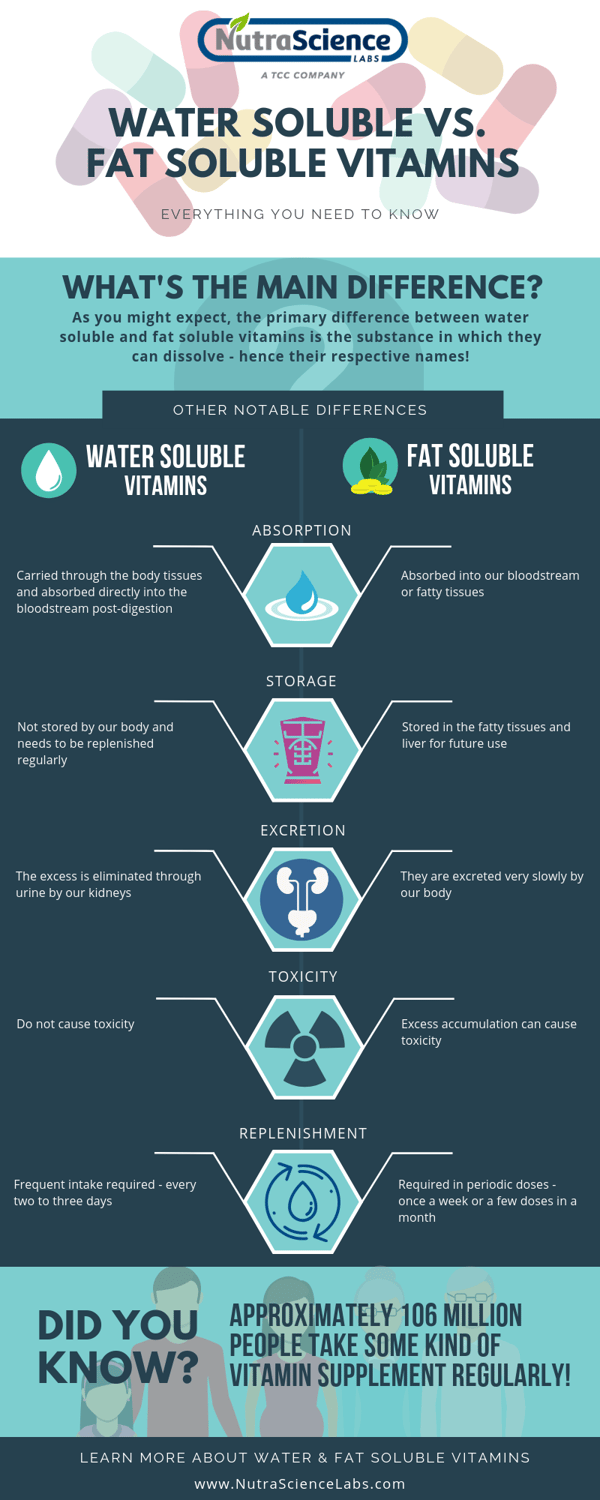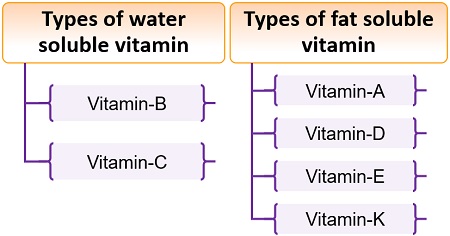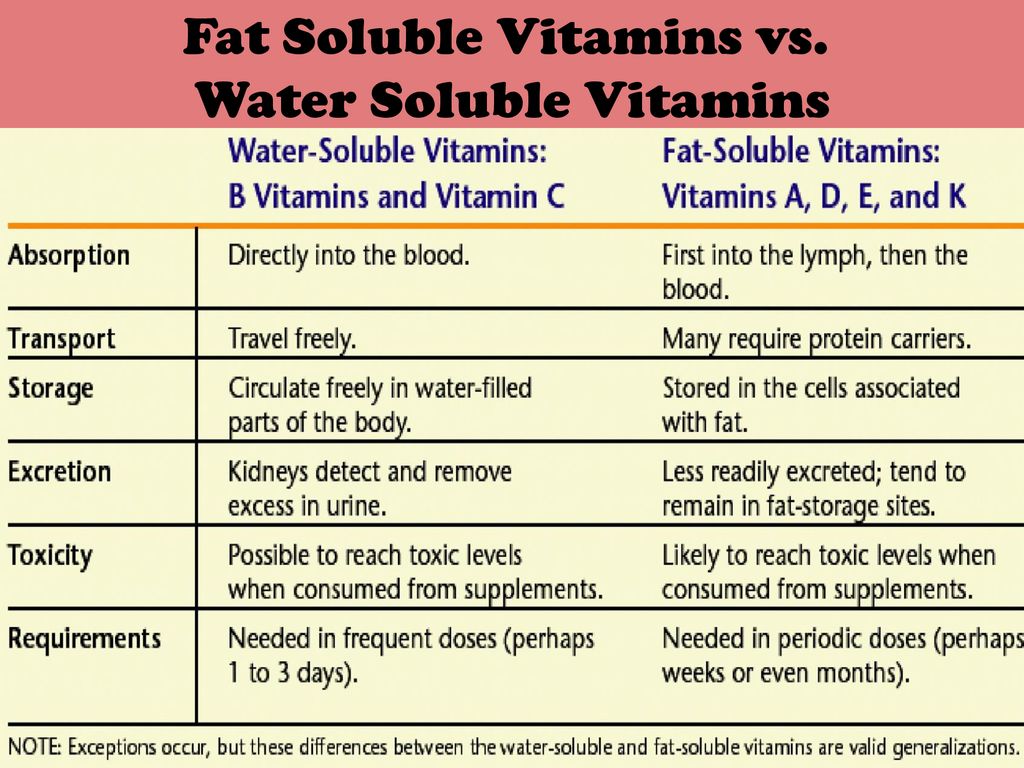Fat-soluble vitamins also play a role in key processes in the human body many of them relate to inflammation oxidative balance and immune function. These vitamins dissolve in fat and are stored in tissue so the body has access to them as needed.

What S The Difference Between Fat Soluble And Water Soluble Vitamins
Fat soluble vitamins can be stored in our body while water soluble vitamins cannot be stored in our body.

. Substances soluble in lipids and fatty media not in aqueous media. Vitamins are essential food factors that require the proper utilization of the other nutrients. While water-soluble vitamins work on the blood or cytosol of cells fat-soluble vitamins ensure that cell membranes are protected from damage.
Identify the main roles deficiency symptoms and food sources for vitamin C. It means they are hydrophobic in nature. Water and fat describe where the vitamins dissolve.
Unlike water-soluble vitamins fat-soluble vitamins can be stored in the body for long-term use. For their part fat-soluble vitamins are absorbed in fats. Describe how B group vitamins can act in concert with each other.
Difference Between Water-Soluble and Fat-Soluble Vitamins. There are four fat-soluble vitamins which include Vitamin A Vitamin D Vitamin E and Vitamin K. Identify the main roles deficiency symptoms and food sources for each of the B vitamins.
Each one has its important function and can be found in a variety of food. The fat-soluble vitamins are A D E and K. Once the body has as much of one as it needs the rest gets flushed out of the body by the kidneys.
Fat-Soluble Vitamins on the other hand are more prone to oil-based medium. The key difference between fat soluble and water soluble vitamins is that the fat soluble vitamins are soluble in fat hence the body absorbs them when bile salts are available while the water soluble vitamins are soluble in water hence the body can easily absorb them. From a nutritional standpoint one needs that macronutrient to absorb the micronutrients.
Fat-soluble vitamins - A D E and K - dissolve in fat and can be stored in your. Because fat is easily stored in your body fat-soluble vitamins can be stored within your fat. The truth is there can be problems with excessive amounts of water-soluble vitamins and upper limits have been set on their consumption.
As such these vitamins must be replaced daily. Any excess that isnt used immediately is stored in the liver and fatty tissue instead of being flushed away. Unlike their fat-soluble counterparts water-soluble vitamins do not stay in the body and are generally eliminated with urination.
Because water-soluble vitamins dissolve in water right away. They are consumed via food or supplement and then excreted via urine. 8 rows 1 Comment Science By Supriya N.
Role of Vitamin A. Vitamin A D E K. The deficiency symptoms of Water Soluble Vitamins appear quicker than the other type.
Similarly vitamins that dissolve in fat are called fat-soluble vitamins. Vitamin A has many. Learning Outcomes Describe how vitamins differ from the energy nutrients and how fat-soluble vitamins differ from water-soluble vitamins.
These Vitamins can easily dissolve in Fat or oil. X Trustworthy Source National Health Service UK Public healthcare system of the UK Go to source As a result you need to consume water-soluble vitamins more frequently. There are also differences in the way they are absorbed as well as stored in the body.
For example one can say vitamin B and Vitamin C is water-soluble vitamin. This means they can accumulate and be saved for later use. Because of this fat-soluble vitamin overdoses are more prevalent than overdoses on water-soluble vitamins.
Unlike water-soluble vitamins any excess of fat-soluble vitamins dont immediately leave the body. Vitamin B-12 is water soluble but can be stored in the liver Fat soluble vitamins are stored in the liver. They are vitamins A D E and K.
Fat-soluble vitamins are vitamin A D E and K while water-soluble. Fat-soluble vitamins are found in high-fat food sources like egg yolks liver beef fatty fish and dairy products. As the name states vitamins that can dissolve in water are called water-soluble vitamins.
Fat Soluble Vitamins. Water soluble vitamins are not actually stored by the body. They are vitamin C and 8 vitamins of group B.
There is one exception to this rule. Vitamin A vitamin D vitamin E and vitamin K are fat-soluble vitamins. The primary fat-soluble vitamins in your diet are vitamins A D E and K.
This means that it would be easier to absorb more fat-soluble vitamins than you really need since they arent being removed by the kidneys after the need is met. Excess fat-soluble vitamins on the other hand wind up stored in the liver where they can build up to the point of causing damage. Fat-soluble vitamins include A D E and K.
The water-soluble vitamins are B complex and C. It does not form a colloidal solution. The Fat Soluble Vitamins are Vitamin A D E and K.
The fact that these vitamins can be stored means that they can also build up to toxic levels when consumed in excessive amounts. Fat soluble vitamins are dissolved in fat and stored in liver and fatty tissues while water soluble vitamins are dissolved in water and eliminated in urine. There are two kinds of vitamins and those are fat-soluble and water-soluble.
Water-soluble vitamins form a homogeneous mixture with water. The water-soluble vitamins on the other hand are not stored in you body and are easily filtered out through your urine which is why taking a daily dose of this is very important. Being fat soluble means that they are absorbed in the lymph are transported in the blood with carrier proteins and they can be stored in the liver and fatty tissues.
Fat-soluble vitamins are absorbed in the lymph transported in the blood and can be stored in the liver and fatty tissues for use as needed. The water-soluble vitamins - C and the B-complex vitamins - dissolve in water before your body can absorb them. Thus these nutrients can build up in the body meaning they can make up for insufficient intakes during a certain period of time.
You can get deficiencies in fat-soluble vitamins when your fat intake is too low or if you cant absorb it. The difference between water-soluble and fat-soluble. These vitamins have different functions.
Water soluble vitamins. Fat-soluble vitamins are quite the opposite. There are two types of vitamins including fat soluble and water soluble which affects their functions in your body.
The fat-soluble vitamins are A. They are water soluble vitamins and aqueous non fat. The fat-soluble vitamins are A D E and K.

Difference Between Water Soluble And Fat Soluble Vitamins With Comparison Chart Biology Reader

Fat Soluble Vitamins Water Soluble Vitamins Ppt Download

Difference Between Water Soluble And Fat Soluble Vitamins Youtube

Water Soluble And Fat Soluble Vitamins Download Scientific Diagram
0 Comments